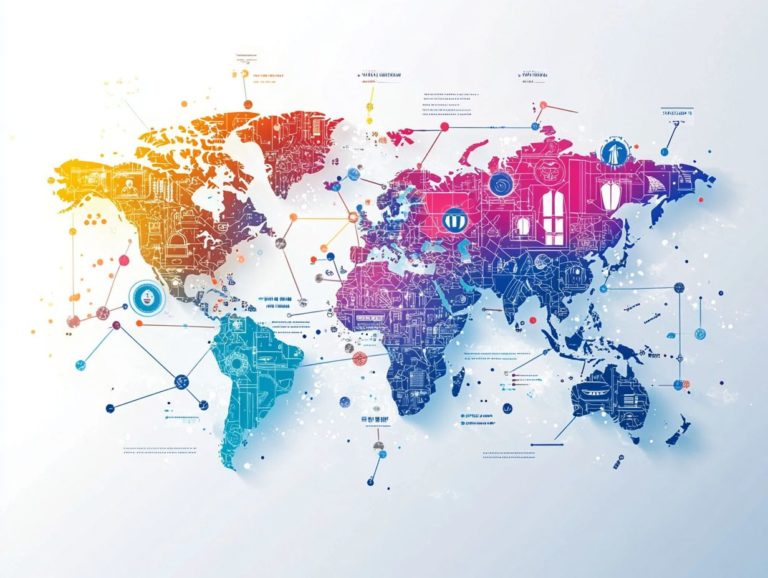5 Common Misconceptions about International IP Law
Understanding international intellectual property (IP) law is essential in today s global marketplace! Don t let misconceptions hold you back. Let s dive in and uncover these myths together. Its significance is often shrouded in misconceptions.
You might think it only pertains to large corporations or that it s solely focused on patents and trademarks. But these beliefs can impede effective IP management.
This article aims to dispel five prevalent myths surrounding international IP law, shedding light on its importance for businesses of all sizes. We will offer crucial insights to help you navigate this intricate landscape.
Whether you re a small business owner or simply intrigued by IP, this guide will illuminate the key elements of international IP law you need to grasp.
Contents
- Key Takeaways:
- 1. International IP Law Is the Same in Every Country
- 2. International IP Law Only Applies to Large Corporations
- 3. International IP Law Is Only Relevant for Patent and Trademark Issues
- 4. International IP Law Is Too Complex for Small Businesses to Understand
- 5. International IP Law Is Not Enforced Effectively
- What Is International IP Law and Why Is It Important?
- Key Components of International IP Law
- How Does International IP Law Differ from Domestic IP Law?
- What Are the Consequences of Not Complying with International IP Law?
- How Can Small Businesses Protect Their Intellectual Property Internationally?
- What Are the Common Challenges of Enforcing International IP Law?
- Frequently Asked Questions
- What are the 5 common misconceptions about International IP Law?
- Is it true that International IP Law only applies to large corporations?
- How is International IP Law different from domestic IP Law?
- Is International IP Law too complex and difficult to understand?
- Does International IP Law only apply to high-tech industries?
- Does International IP Law only benefit developed countries?
Key Takeaways:

1. International IP Law Is the Same in Every Country
Many assume that international intellectual property (IP) law functions uniformly across borders. However, this belief neglects vital distinctions in patent protection, trademark registration, and copyright enforcement.
Each country has its unique legal landscape and how laws are applied and enforced, including international treaties like the Patent Cooperation Treaty.
Take China, for example. Its rapid technological advancement has developed a unique way of handling IP laws that prioritizes domestic innovation. This often leaves foreign businesses concerned about enforcing their rights.
The United States boasts a more established legal framework. It champions robust patent rights and a thorough trademark registration process, providing a solid foundation for international companies aiming to protect their assets.
The European Patent Office strives for harmonization among member states. It enforces rigorous examination procedures that can slow down applications.
These differing standards significantly influence how you manage your IP portfolio globally. It s imperative to grasp local regulations to navigate potential risks and seize opportunities in the ever-evolving world of international IP law.
2. International IP Law Only Applies to Large Corporations
A prevalent misconception suggests that international intellectual property (IP) law primarily serves the interests of large corporations. However, the truth is small companies can and should harness IP rights to safeguard their innovations.
By crafting a comprehensive IP strategy, you can identify your unique assets everything from trademarks to trade secrets. Educating yourself on the legal landscape will enable you to navigate potential challenges that may arise.
Consider a local tech startup. They successfully protected their software through patenting, effectively preventing larger competitors from copying their work. They thrived by securing their innovations through strategic enforcement actions, like sending cease-and-desist letters, successfully deterring infringement.
These case studies illustrate that when small companies actively engage in protecting their intellectual property, they not only safeguard their innovations but also enhance their market visibility and credibility.
3. International IP Law Is Only Relevant for Patent and Trademark Issues
While you might think international IP law is just about patents and trademarks, it actually covers a broader spectrum of protections.
This includes copyright for creative works and the complexities of licensing agreements that enable global commerce.
This legal framework is vital for protecting innovations across diverse sectors, from technology to entertainment.
For example, a software company needs to navigate copyright laws to safeguard its algorithms. They also need to ensure they can license their products worldwide without stepping on anyone’s toes.
Similarly, a fashion brand operating in multiple countries depends on trademark regulations to thwart counterfeiting efforts and uphold its reputation.
The implications of these laws go beyond simple compliance; they influence the strategies of companies aiming to expand into international markets. Understanding intellectual property rights is not just beneficial it’s essential for achieving sustained success in today’s interconnected economy.
Don t miss out on protecting your business understand your rights today!
4. International IP Law Is Too Complex for Small Businesses to Understand

International intellectual property (IP) law may seem daunting to small business owners, but grasping its fundamentals is crucial for building a robust IP portfolio and effectively managing employee agreements and NNN agreements.
By breaking down these complexities into manageable parts, you can safeguard your innovations while ensuring compliance with various international regulations. Seek guidance from legal professionals; they can help explain IP laws and provide tailored advice that aligns with your unique needs.
Consider participating in workshops or webinars focused on IP fundamentals. Tap into online resources like industry-specific forums and utilize government-provided guides to enhance your understanding.
By cultivating a strong foundation in IP principles, you can confidently pursue global opportunities, protect your assets, and boost your competitiveness in the marketplace.
5. International IP Law Is Not Enforced Effectively
Many believe international intellectual property (IP) law is not effectively enforced due to high-profile cases of IP theft and counterfeit goods. However, many ways to enforce your IP rights are available across diverse legal landscapes.
Effective enforcement is crucial in deterring potential infringers, allowing you to conduct your business without the constant fear of theft. In regions like the European Union, strict regulations and prompt legal remedies have led to notable successes against violators.
For example, brand owners have successfully pursued damages and obtained injunctions against counterfeiters. This highlights the importance of having strong legal frameworks to protect your innovations. By leveraging these legal avenues, you can enhance your defenses while remaining attuned to regional differences.
What Is International IP Law and Why Is It Important?
International intellectual property (IP) law comprises a comprehensive set of regulations designed to protect and enforce IP rights, including patent protection, trademark registration, and copyright protection. This legal framework plays a critical role in fostering innovation and creativity worldwide while safeguarding creative works.
For businesses operating across borders, grasping international IP law is crucial to your success. It offers a consistent mechanism for protecting inventions and brand identities in various jurisdictions.
By providing a safety net for innovative ideas, international IP law encourages you to invest in research and development, ensuring your creations are protected from unauthorized use and reproduction.
Navigating the complexities of global markets with robust IP protection can provide a significant competitive advantage, contributing to economic growth and cultural exchange in our interconnected world.
Key Components of International IP Law
The key components of international intellectual property (IP) law encompass various patent categories, trademark rights, copyright material, and the intricacies of licensing agreements. Each of these elements is essential for your business navigating global markets.
By understanding these components, you can effectively protect your innovations and creative works across borders, giving you a competitive edge in international trade. Different patent categories safeguard your inventions, ensuring you can secure exclusive rights to your technologies.
Trademark rights are critical for establishing brand identity, helping build trust and recognition among consumers. Copyright laws protect your artistic and literary works, which are vital in industries like media and entertainment.
Understanding licensing agreements opens doors to strategic partnerships and revenue generation. It s imperative to be well-versed in these regulations to develop a robust IP strategy.
How Does International IP Law Differ from Domestic IP Law?

International IP law and domestic IP law differ significantly, especially in enforcement actions, legal frameworks, and public awareness of IP rights.
These differences create a complex environment for businesses operating across borders. You will navigate a maze of varying legal interpretations and enforcement practices.
In some jurisdictions, IP laws are strict and backed by strong enforcement mechanisms. In others, a more lenient approach prevails, leading to inconsistent protections for your intellectual assets.
The lack of harmonization among international regulations introduces compliance uncertainties, which can open the door to litigation. This adds layers of risk to your operations, especially if your business relies on innovation and branding.
As you align your strategies with diverse legal systems, effectively protecting your intellectual property rights becomes crucial.
What Are the Consequences of Not Complying with International IP Law?
Not complying with international IP law can lead to serious issues, including infringement matters and civil litigation. This puts your valuable IP rights at serious risk and jeopardizes your overall market strategy.
This isn’t merely hypothetical; many companies have faced dire consequences due to oversight. Consider a prominent tech firm in the United States that became entangled in a lengthy lawsuit after inadvertently violating a competitor’s patent. The resulting settlement cost millions and significantly impacted its financial health.
A smaller business faced the daunting prospect of losing its trademarks by neglecting to enforce its rights in overseas markets, allowing competitors to exploit its brand identity.
These real-world examples underscore the importance of adhering to IP laws to protect your assets and maintain a competitive edge.
How Can Small Businesses Protect Their Intellectual Property Internationally?
Small businesses can protect their IP internationally with a solid strategy. Here are some effective steps:
- Prioritize registering your patents and trademarks in key markets to secure your innovations and brand identity.
- Establish clear employee agreements to clarify ownership of creations developed during employment.
- Familiarize yourself with non-disclosure, non-use, and non-circumvention agreements (NNN agreements) to strengthen your position when collaborating with overseas partners.
By implementing these strategic steps, small businesses can significantly reduce the risks of intellectual property theft while enhancing their competitive edge in the global marketplace.
What Are the Common Challenges of Enforcing International IP Law?
Enforcing international IP law is challenging due to counterfeit goods and varying enforcement measures. These issues are evident across sectors, from fashion to pharmaceuticals.
Counterfeit products erode brand value and pose significant safety risks to consumers. For example, luxury brands often see their high-end products replicated at alarming rates, resulting in substantial revenue losses.
To effectively tackle these challenges, consider adopting a multi-faceted strategy that includes:
- Rigorous monitoring of online marketplaces.
- Establishing strong partnerships with law enforcement agencies.
- Educating consumers about the dangers of counterfeit goods.
By prioritizing these proactive measures, you ll be better positioned to safeguard your IP and promote respect for intellectual property rights worldwide.
Frequently Asked Questions

What are the 5 common misconceptions about International IP Law?
Here are five common misconceptions:
1) It only applies to large corporations.
2) It is the same as domestic IP Law.
3) It is too complex to understand.
4) It is only relevant for high-tech industries.
5) It mainly benefits developed countries.
Is it true that International IP Law only applies to large corporations?
No, International IP Law applies to all individuals and businesses, regardless of size. It protects the rights of all creators and innovators, including small businesses and individual entrepreneurs.
How is International IP Law different from domestic IP Law?
International IP Law covers rules for intellectual property worldwide. In contrast, domestic IP Law only applies within one country.
Is International IP Law too complex and difficult to understand?
International IP Law can be complex, but it is not impossible to grasp. Legal professionals can guide you through its intricacies.
Does International IP Law only apply to high-tech industries?
No, it covers all types of intellectual property, including patents, trademarks, copyrights, and trade secrets. These rights matter across many industries, from technology to fashion to food.
Does International IP Law only benefit developed countries?
No! International IP Law is designed to protect creators from all countries. It creates opportunities for everyone to innovate and thrive in the global market.






